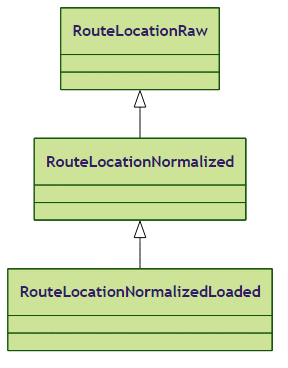Vue路由TypeScript进阶:守卫与元字段类型强化指南
Vue路由进阶:TypeScript下的守卫与元字段类型强化
一、守卫参数的类型定义
在Vue Router的TypeScript集成中,路由守卫的参数具有明确的类型定义,这为开发者提供了更好的类型安全性和代码提示。
1. NavigationGuardNext类型详解
NavigationGuardNext是Vue Router提供的核心类型,用于定义守卫函数中的next参数:
interface NavigationGuardNext {
(): void
(error: Error): void
(location: RouteLocationRaw): void
(valid: boolean): void
}典型使用场景:
import { NavigationGuardNext, RouteLocationNormalized } from 'vue-router'
const authGuard = (
to: RouteLocationNormalized,
from: RouteLocationNormalized,
next: NavigationGuardNext
) => {
if (to.meta.requiresAuth && !isAuthenticated()) {
next('/login') // 重定向
} else if (to.path === '/admin' && !isAdmin()) {
next(false) // 中断导航
} else {
next() // 正常放行
}
}类型增强实践:
// 自定义增强类型
type ExtendedNext = NavigationGuardNext & {
(valid: false, redirectPath: string): void
}
const customNext: ExtendedNext = (valid, redirectPath) => {
if (valid === false) {
router.push(redirectPath)
}
}2. 路由位置类型体系
Vue Router 4.x提供了完整的路由位置类型:

类型转换示例:
const normalizeRoute = (
location: RouteLocationRaw
): RouteLocationNormalized => {
return router.resolve(location)
}实践建议:
- 优先使用
RouteLocationNormalized而非RouteLocationRaw作为守卫参数类型 - 在组件内守卫中使用
RouteLocationNormalizedLoaded获取完整路由信息 - 使用
router.resolve()方法将原始路由转换为标准化对象
二、meta字段的类型扩展
1. 基础类型定义
Vue Router的meta字段默认是RouteMeta接口类型:
interface RouteMeta {
[key: string]: any
}2. 自定义元字段类型
步骤1:扩展RouteMeta接口
// router.d.ts
import 'vue-router'
declare module 'vue-router' {
interface RouteMeta {
requiresAuth?: boolean
roles?: string[]
breadcrumb?: {
title: string
icon?: string
}
cacheKey?: string
}
}步骤2:类型化路由配置
const routes: Array<RouteRecordRaw> = [
{
path: '/admin',
meta: {
requiresAuth: true,
roles: ['admin'], // 现在有自动补全
breadcrumb: {
title: 'Admin Panel'
}
}
}
]3. 类型安全访问
在守卫中使用类型化的meta:
const roleGuard = (
to: RouteLocationNormalized,
from: RouteLocationNormalized,
next: NavigationGuardNext
) => {
if (to.meta.roles && !to.meta.roles.includes(currentUser.role)) {
next('/forbidden')
} else {
next()
}
}进阶模式 - 类型守卫:
function hasRequiredMeta(
meta: RouteMeta
): meta is { requiresAuth: true; roles: string[] } {
return !!meta.requiresAuth && Array.isArray(meta.roles)
}
if (hasRequiredMeta(to.meta)) {
// 此处to.meta自动推断为增强类型
}4. 组合式API中的类型使用
import { useRoute } from 'vue-router'
export default {
setup() {
const route = useRoute()
// 自动推断meta类型
if (route.meta.requiresAuth) {
// ...
}
}
}实践建议:
- 将meta类型扩展集中声明在
router.d.ts文件中 - 为常用meta字段添加JSDoc注释增强开发体验
- 对复杂的meta结构使用工具类型(如
Partial、Readonly) - 在团队协作项目中维护共享的meta类型定义
三、类型安全的最佳实践
- 守卫组合:将类型化的守卫组合成可复用单元
type Guard = (
to: RouteLocationNormalized,
from: RouteLocationNormalized,
next: NavigationGuardNext,
options?: GuardOptions
) => void
function createGuard(guard: Guard): Guard {
return (to, from, next) => guard(to, from, next)
}- 异步守卫处理:
async function asyncGuard(
to: RouteLocationNormalized,
from: RouteLocationNormalized,
next: NavigationGuardNext
) {
try {
const result = await checkPermissions(to)
next(result ? undefined : '/denied')
} catch (error) {
next(error)
}
}- 类型测试验证:
import { assertType } from 'vitest'
assertType<RouteMeta>({
requiresAuth: true,
roles: ['admin']
})通过强化Vue Router的类型定义,开发者可以获得:
- 更准确的代码提示
- 编译时类型检查
- 更好的代码可维护性
- 更安全的元数据访问
这些TypeScript增强特性特别适合中大型项目,能够有效减少运行时错误并提高开发效率。
评论已关闭